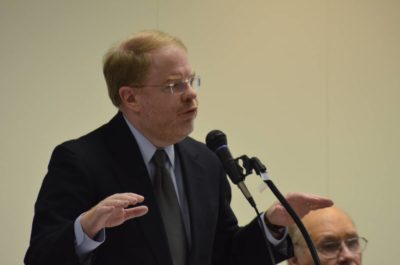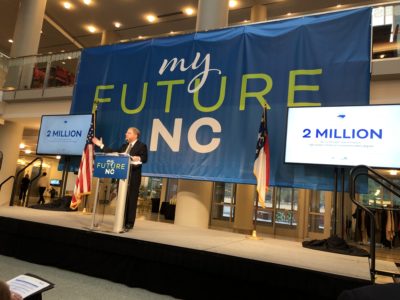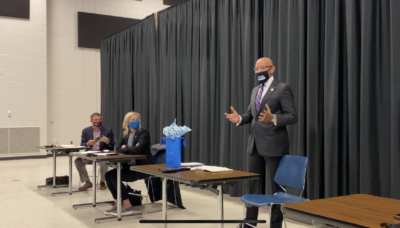UNC System President Peter Hans gave a keynote at the North Carolina Community College System’s 2021 virtual conference on Monday, Feb. 15. Hans discussed the role of community colleges in workforce development coming out of the COVID-19-induced recession, common course numbering among the UNC System schools, and raising the out-of-state cap for HBCUs.
“I’m troubled, as I know many of you are, about the divisions emerging in the country. I’m especially troubled that so many of them seem to break along educational lines,” he said. “Too many Americans without a college degree or credential — often heavily concentrated in rural areas — feel a deep sense of alienation. And not just from colleges and universities, but from government and from media and big institutions of all kinds.”
Hans, formerly the president of the N.C. Community College System, spoke in support of common course numbering among UNC System schools. This is part of a greater push to reduce administrative hurdles for students, especially those transferring from community colleges to the university system.
“I’ve devoted a lot of my time over the last few years — both in my prior role in community colleges and universities — supporting myFutureNC and the statewide goal of seeing two million more North Carolinians with a degree or valuable credential by 2030,” Hans said. “Reducing administrative burden on students is the low-hanging fruit of that effort. And we owe our state an all-out effort to get rid of any bureaucratic barrier that’s holding our students back from learning new skills and earning new credentials.”
David English, vice president for academic programs, faculty, and research at the UNC System, said common numbering is a top priority for Hans.
“We have established a collaborative working group that contains representation from all 17 UNC System institutions and the System Office and will be working this spring to develop a comprehensive plan that implements the Board of Governors policy directive,” he said.
Hans also expressed concern in his keynote over students turning to for-profit colleges as UNC System schools have moved online.
“Far too many students who went looking for a real education were instead deceived by some — not all, but some — for-profits right here in North Carolina,” he said. “Thousands of students who needed help were left to cope with the fallout from schools that borrow the credibility of college but offered very little of the value.”
Hans said that even though he is president of a university system, he believes there is work to be done to reduce the stigma of not completing a four-year degree.
“I absolutely think more people deserve the opportunity to go to college, and that we need for students of all backgrounds to achieve higher levels of education,” he said. “But I also believe that there must be more than one path to success and respect in American life.”
Raising out-of-state student cap for HBCUs
The UNC System penalizes schools if more than 18% of their student body is comprised of out-of-state students. But some HBCUs have been allowed to exceed that cap on a trial basis.
Hans said he wants to permanently raise the cap for the five public HBCUs from 18% to 25%.
“I’m actually right now working to pass a change in our Board policy, allowing five HBCUs to take a greater number of out-of-state students,” he said.
Hans asked members of the UNC Board of Governors for their support in a committee meeting on Wednesday.
“We’ve looked very closely at how to best correct for the historic under investment in these universities,” he said. “And one of the most effective and efficient steps we can take is to amend the cap on out-of-state students to allow our HBCUs, and only the HBCUs, to welcome more students from across the country.”
Hans told the committee he believes the proposal will improve financial stability and raise graduation rates without taking seats away from in-state students.
The proposal would apply to all five HBCUs in the UNC System — Elizabeth City State University, Fayetteville State University, North Carolina A&T State University, North Carolina Central University, and Winston-Salem State University. But Board member Steven Long said he believes each university should make its case individually for raising the out-of-state cap.
“I feel like every school should make the case themselves with that answer,” he said. “I feel like other schools in our system could have made the very same arguments.”
Board member Anna Spangler Nelson, who voted to approve the measure in committee, said she believes raising the cap will not raise the barrier for in-state students.
“Fundamentally important to me is that this not be at the cost of access to qualified North Carolinians and not be at financial cost to North Carolina taxpayers,” she said.
In a letter to president Hans, the chancellors of the five UNC System HBCUs requested the change in the out-of-state cap on Feb. 3.
The letter said that 32% of non-resident students (NRS) from N.C. A&T State University were employed in North Carolina within four quarters after graduation between 2016 and 2019 — higher than the systemwide average.
The letter also expressed a commitment to continue higher academic standards for out-of-state applicants compared to in-state applicants.
The Board’s education planning committee approved the measure on Wednesday, and it will be put to a vote before the full Board at its next meeting April 21-22.




